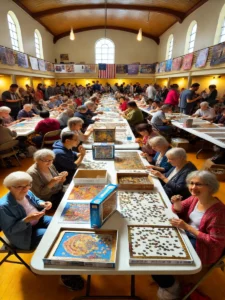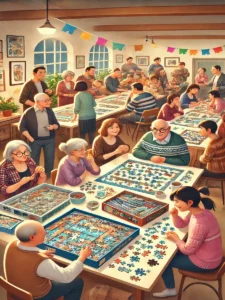Are you ready to host a Puzzle Swap? Do you want to swap your jigsaw puzzles?
Hosting a puzzle swap is a fantastic way to bring puzzle enthusiasts together, build community spirit, and share the joy of puzzle-solving. Whether you’re planning to host the event as an individual, through a puzzle club, or at a library, you can’t go wrong sharing your love of puzzles with your community. Whether your guests play jigsaw puzzles to relax or you are a serious speed puzzle competitor, it’s a community event you might consider attending.
Table of Contents
What makes a puzzle swap so fun? You, your neighbors and the jigsaw puzzles everyone brings. The commodity of puzzles is better for some (especially those individuals who are coming) so giving everyone a chance to pick, choose and share is a gift many people appreciate. Some people want to give jigsaw puzzles they have solved to others in a way to share memories. Other people are concerned as they need to clean out their closets before they can buy more jigsaw puzzles to play.
It’s important to point out that puzzle swaps by libraries and puzzle clubs play a crucial role in making puzzles accessible to low-income families, neighbors, and others in the community. By hosting free puzzle events and swaps, libraries can provide a cost-effective way for families to enjoy high-quality puzzles without the financial burden. Additionally, libraries can collaborate with local schools and community centers to distribute puzzles and create engaging puzzle-solving workshops, ensuring that everyone could experience the joy and educational benefits of puzzles.

Puzzle clubs can also extend their reach to underprivileged communities by organizing donation drives for puzzles and hosting inclusive events in accessible locations. By partnering with local charities and social service organizations, puzzle clubs can identify families and individuals who would benefit from these activities. Offering free memberships or discounted rates to low-income participants can further encourage community involvement and foster a welcoming environment for all puzzle lovers.
The opportunities are endless when it comes to engaging and bringing puzzles to the people with a puzzle swap. It’s an exciting opportunity that you might want to host on a regular basis.
Start Planning Your Puzzle Swap
- Set a Date and Time: Choose a date and time that works for your target audience. Weekend afternoons are often ideal as they allow for a relaxed, unhurried atmosphere.
- Select a Venue: Find a suitable venue with enough space for participants to display and swap puzzles. Consider community centers, local libraries, or even your living room. Most puzzle swaps can be done in a parking lot too.
- Create a Guest List: Invite friends, family, and community members who love puzzles. Use social media, local bulletin boards, and word of mouth to spread the word.
- Set a Theme: Add fun by setting a theme, such as “Vintage Puzzles” or “Nature Scenes.” This can help guide the types of puzzles people bring and make the event more cohesive.
- Plan the Layout: Arrange tables or spaces where participants can display their puzzles. Make sure there’s enough room for easy browsing and swapping.
- Provide Clear Instructions: Create a handout or poster explaining how the swap will work. Include information on puzzle condition standards and the swapping process.
- Establish Swap Rules: Decide on and communicate the rules for the swap. For example, participants could exchange puzzles one-for-one or use a ticket system.
- Gather Supplies: Ensure you have enough tables, chairs, and signage. Consider providing name tags and markers for participants to label their puzzles.
- Promote the Event: Use social media, local newspapers, and community boards to advertise the swap. Highlight any special features like refreshments or themed activities.
- Prepare for Setup: Arrive early on the day of the event to set up tables, signs, and any additional materials. Having everything ready before participants arrive will ensure a smooth start.
Engaging the Community: Talk about Puzzles
- Partner with Local Businesses: Ask local bookstores, cafes, or hobby shops to co-sponsor the event. They might provide refreshments, door prizes, or advertising support for your puzzle swap.
- Invite Puzzle Clubs: Reach out to local puzzle or game clubs to join the swap. Their members can add to the diversity of puzzles and help spread the word.
- Collaborate with the Library: If hosting at a library, involve the librarians in planning. They can help promote the event and provide additional resources.
- Feature Local Artists: Invite local artists to create puzzle-themed artwork or even custom puzzles. Displaying their work can add a unique touch to the event.
- Host a Puzzle Competition: Organize a friendly puzzle-solving competition. This can add excitement and draw more participants.
- Offer Workshops: Provide short workshops on puzzle-making or tips for solving difficult puzzles. This adds value to the event and attracts a broader audience.
- Create a Puzzle Library: Start a community puzzle library where people can borrow and donate puzzles. This encourages ongoing participation beyond the event.
- Include Family-Friendly Activities: Set up a kids’ corner with easy puzzles and related activities. Ensuring the event is family-friendly can increase attendance.
- Engage Local Media: Contact local newspapers and radio stations to cover the event. Media coverage can increase visibility and attract more participants.
- Use Social Media: Create an event page on social media platforms. Share updates, puzzle tips, and sneak peeks to keep the community engaged. Make sure you connect with Facebook puzzle groups as you will find they have a lot of people who play jigsaw puzzles.
Hosting a Puzzle Swap as an Individual
- Personal Invitations: Send out personal invitations to friends and family. A personal touch can increase attendance and enthusiasm.
- Potluck Refreshments: Ask attendees to bring a small dish to share. This creates a communal atmosphere and keeps costs down.
- Create a Cozy Atmosphere: Host the event in your living room or backyard. Add comfortable seating, music, and decorations to make it inviting.
- Labeling System: Use sticky notes or cards to label puzzles with their difficulty level and number of pieces. This helps participants quickly find puzzles that match their interests.
- Puzzle Stories: Encourage participants to share stories about their favorite puzzles. This can spark conversations and deepen connections.
- Host Regular Swaps: Plan to host puzzle swaps regularly so people know about what time of the month it might be held and can make plans accordingly.
- Create a Swap List: Maintain a list of attendees and the puzzles they bring. This helps track swaps and ensures everyone gets a fair exchange.
- Provide Bags or Boxes: Offer reusable bags or boxes for participants to carry their swapped puzzles home. This adds a thoughtful touch and is practical.
- Thank-You Notes: Send thank-you notes to attendees after the event. Expressing gratitude helps build a sense of community and encourages future participation.
- Photo Booth: Set up a puzzle-themed photo booth. It’s a fun way for attendees to capture memories and share the event on social media.
Hosting a Puzzle Swap through a Puzzle Club

- Club Meetings: Incorporate the swap into a regular club meeting. This ensures attendance and integrates the swap into the club’s activities.
- Special Guest Speakers: Invite a local puzzle maker or enthusiast to speak at the event. Their insights and stories can add depth to the experience.
- Club Membership Drive: Use the event as an opportunity to recruit new members. Have membership information and sign-up forms available.
- Collaborative Puzzle Building: Set up a large communal puzzle for participants to work on together. This fosters teamwork and adds a fun, interactive element.
- Member Contributions: Encourage club members to bring snacks, drinks, and decorations. This makes the event a collective effort and lightens the load on organizers.
- Club Fundraising: Consider charging a small fee for participation to fund future club activities. Alternatively, sell puzzle-themed merchandise to raise funds.
- Puzzle Raffles: Organize a raffle with donated puzzles as prizes. This adds excitement and helps raise funds for the club.
- Skill-Sharing Sessions: Host short sessions where members can share tips and techniques for solving complex puzzles. This educational component can attract more participants.
- Puzzle Showcase: Display rare or unique puzzles from members’ collections. This adds a museum-like element and can draw in puzzle enthusiasts.
- Feedback Loop: After the event, gather feedback from participants to improve future swaps. This helps refine the event and make it more enjoyable for everyone.
Hosting a Library Puzzle Swap Event
- Library Resources: Utilize the library’s resources to promote the event, such as newsletters, websites, and bulletin boards. Libraries often have a broad reach in the community.
- Book and Puzzle Pairings: Create displays pairing puzzles with related books. This can attract both puzzle enthusiasts and book lovers.
- Reading Room Setup: Use the library’s reading rooms or conference spaces for the swap. These areas are often well-suited for quiet, focused activities.
- Educational Component: Include an educational session about the history of puzzles or famous puzzle makers. This can add a learning aspect to the event.
- Children’s Corner: Set up a special area with puzzles for children, along with related storytime sessions. This makes the event family-friendly and engaging for all ages.
- Library Cards: Encourage attendees to sign up for library cards if they don’t already have one. This promotes library services and can boost membership.
- Librarian Involvement: Involve librarians in the event planning and execution. Their expertise and organizational skills can be invaluable.
- Quiet Zones: Ensure there are quiet zones where people can work on puzzles in silence. This respects the library environment and caters to those who prefer a quieter setting.
- Community Partners: Partner with local schools or community centers to co-host the event. This can increase attendance and foster community collaboration.
- Follow-Up Events: Plan follow-up events, such as puzzle-solving workshops or puzzle-making classes. This keeps the momentum going and maintains community interest.
It’s Time to Swap Puzzles
A puzzle swap can be a perfect opportunity to meet new people, talk puzzles and get to know your neighbors even better. While it might be a lot of work (which it is) don’t think for a minute you won’t be rewarded. After all sharing puzzles is a great way to get a few jigsaw puzzles that you want too!
